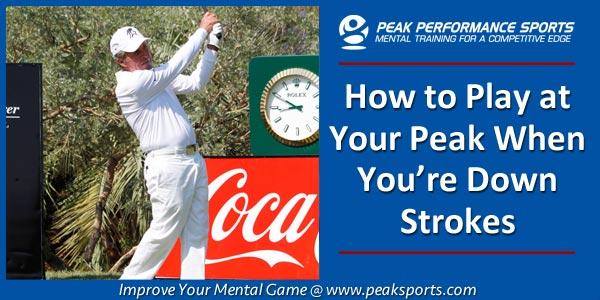
Your Mental Game in Golf
Golf is a game of ups and downs, great shots and easy misses, high and low scores, playing with the lead and playing from behind.
Playing a round from behind is one of the more challenging aspects in golf. It is a challenge every golfer will face at one time or another.
But isn’t that why you chose to play the sport of golf?… For the excitement?… For the challenges?
Each course, each round of golf, each tournament tests your physical and mental prowess.
Your mental game and what you focus on that determines if you overcome the challenges on the golf course.
You can choose what you focus on when trailing by 2-3 strokes in a tournament…
Do you think about the score (the outcome) or hitting good shots (the process)?
Why do some golfers fall apart when trailing by 2-3 strokes?
Many argue that focusing on the score helps motivate a golfer.
In reality, focusing on the outcome of a hole or the score is just a distraction from what you need to do for each shot.
When you focus on score, that can limit you when playing well or poorly.
In fact, worrying about the score does not change the score at all–it can hurt your score..
Preparing your best for each golf shot and focusing on execution affects your score. So, your focus should be on immersing yourself into your routine rather than, “I have to make up two strokes.”
Golf Legends And Their Comebacks
Most great professional golfers have made comebacks on the last day of play to win a tournament.
Jack Nicklaus won eight tournaments after being behind on the last day of play.
Arnold Palmer came from seven back at the 1960 U.S. Open in Cherry Hills to secure a victory.
Gary Player overcame a seven-shot deficit to win the 1978 Masters.
Nick Faldo won the 1989 Masters from five back and the 1996 Masters from six back.
You are probably thinking, “But they are champions and more skilled than I am.”
There is no doubt that skill helps in mounting a comeback but focusing on the process helped them hit great golf shots when needed.
How do you focus on the process when down 2-3 strokes?
First, when you focus on the process, the results will take care of themselves.
Think of the times you played your best golf and you will find that you were not analyzing every shot or thinking about possible scenarios at the end of the day.
Rather, you probably focused on doing your “homework” for each shot, committing to a plan, and having confidence you could execute the plan.
This has been your recipe for success in the past and is the mentality you want to adopt for each shot. This way, each shot becomes a round by itself.
Try these tips to play at your peak when down 2-3 strokes:
- Tip #1: Ask yourself the important questions, “How do I want to play this hole?” “What do I need to focus on right now?”
- Tip #2: Stick with your first instinct or decision and don’t second-guess every plan. Don’t over-think a chip shot by debating every possible way you can hit it. Trust your first plan and execute the shot with commitment.
Successful golfers have learned how to perform with ultimate confidence in competition. We’ve developed The Golfer’s Mental Edge Workbook Program to help you do this.
Related Sports Psychology Articles
- Play Golf Beyond Your Comfort Zone
- Execute Your Range Swing to the Golf Course
- Starting Your Golf Round with a Calm Mindset
*Subscribe to The Sports Psychology Podcast on iTunes
*Subscribe to The Sports Psychology Podcast on Spotify
Download a free sports psychology report to improve your mental game!
Learn more about our one-on-one mental game coaching.
Golfer’s Mental Edge

What’s the big sign that your mental game is the weak link in your golf game? When you can’t play consistently as well as when you play a practice or casual round–or your range game is way better than your game on the course. If you suffer from lack of focus, low self-confidence, poor composure or other mental game obstacles on the course, you can’t reach your true potential in golf.
The Golfer’s Mental Edge 2.0 Audio and Workbook program is ideal for any amateur, collegiate, junior, and tour professional golfer.
Golf coaches and instructors would also be wise to teach “The Golfer’s Mental Edge 2.0” principles to their players. This program is perfect for any golfer who wants to improve performance and consistency by managing their mind better on the course.
